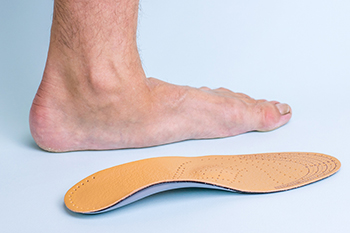
The feet, and the arch, bear the body’s weight, and provide support and shock absorption. The arch is composed of several different structures, with the ligaments providing the lion’s share of stability and support. Excessive forces placed on the feet due to obesity can change the foot’s structure, negatively affecting the ligaments of the arch, and even causing flat feet in many overweight people. Studies even suggest that the degree of an overweight person’s flat footedness is directly correlated to their level of obesity, with a higher Body Mass Index (BMI) correlated with a lower plantar arch height. People with flat feet might experience complications such as plantar fasciitis, muscle cramping, arthritis, Achilles Tendonitis, and other forms of foot discomfort or pain. A podiatrist can help anyone, regardless of weight, who is experiencing discomfort from flat feet with custom orthotic devices, supportive shoes, stretching exercises and stretches, physical therapy, pain management medication and more.
Flatfoot is a condition many people suffer from. If you have flat feet, contact one of our podiatrists from New England Foot and Ankle. Our doctors will treat your foot and ankle needs.
What Are Flat Feet?
Flatfoot is a condition in which the arch of the foot is depressed and the sole of the foot is almost completely in contact with the ground. About 20-30% of the population generally has flat feet because their arches never formed during growth.
Conditions & Problems:
Having flat feet makes it difficult to run or walk because of the stress placed on the ankles.
Alignment – The general alignment of your legs can be disrupted, because the ankles move inward which can cause major discomfort.
Knees – If you have complications with your knees, flat feet can be a contributor to arthritis in that area.
Symptoms
- Pain around the heel or arch area
- Trouble standing on the tip toe
- Swelling around the inside of the ankle
- Flat look to one or both feet
- Having your shoes feel uneven when worn
Treatment
If you are experiencing pain and stress on the foot you may weaken the posterior tibial tendon, which runs around the inside of the ankle.
If you have any questions please feel free to contact one of our offices located in Chelmsford and Newburyport, MA . We offer the newest diagnostic and treatment technologies for all your foot and ankle needs.
